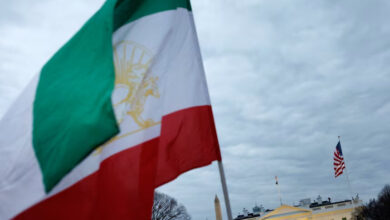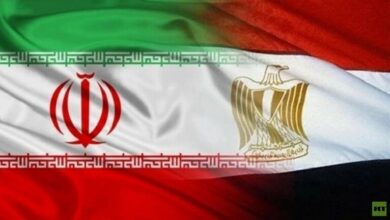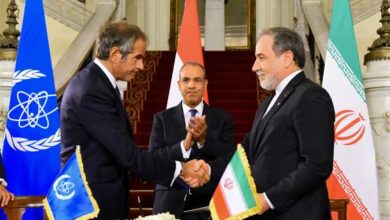Iranian President Mahmoud Ahmadinejad arrived in Egypt on Tuesday, marking the first visit by an Iranian head of state since 1979.
Ahmadinejad is in Cairo to attend the Organization of Islamic Cooperation summit, which starts Wednesday, but the visit signals much more: a dramatic shift in Egypt-Iran relations.
Despite this, some argue that due to the geopolitical context, bilateral relations may not be that easy to fully restore.
“Egyptian decision-making is not sovereign,” says columnist Fahmy Howeidi.
He argue that Egypt’s plans to resume full ties with Iran is restricted by conditions set by the United States for the region — namely the continuation of the peace treaty with Israel and a boycott of Iran that is in line with US sanctions.
Howeidi, who was scheduled to meet Ahmadinejad along with other intellectuals and journalists, sees the visit as merely cosmetic, saying it would not lead to any concrete change in the nature of relations.
Upon his arrival Tuesday, Ahmadinejad met his counterpart, President Mohamed Morsy for an hour. Reuters reported that Morsy kissed Ahmadinejad after he landed at Cairo airport and gave him a red carpet reception with military honors.
However, the Iranian president was not as warmly welcomed by Al-Azhar, Sunni Islam’s highest seat of learning.
During a press conference at the institution, after meeting Grand Sheikh Ahmed al-Tayyeb, Ahmadinejad said, "Egypt and the Egyptian people have a place in the hearts of the Iranian people,” adding that he hoped this would be "a new starting point in relations between us."
Al-Azhar clerics, however, used this opportunity to stress Egypt’s rejection of Iran’s interference in Gulf affairs, as well as its attempts to extend Shia Islam in Sunni majority countries.
After meeting Ahmadinejad, Tayyeb demanded in a statement, that "the Iranian president respect Bahrain as a brotherly Arab nation, and not interfere in the affairs of Gulf states." He did not attend the press conference later.
Senior Al-Azhar cleric Hassan al-Shafie, who spoke after Ahmadinejad at the press conference, launched into a tirade against "some Shias" for insulting some of the Prophet Mohamed's companions as the Iranian president listened with noticeable unease.
Thawing ties
Regardless of the rhetoric surrounding it, the visit is in of itself historic.
Relations between Egypt and Iran were cut after Tehran’s Islamic revolution in 1979. While many countries were estranged, Egypt gave asylum to Iran's exiled Shah Reza Pahlavi. Iran later named a street after the man who assassinated Egypt's President Anwar Sadat.
Since then, heads of state have not exchanged visits, and bilateral ties have been limited, until Morsy visited Iran last year to attend the Non-Aligned Movement Summit.
Since the 2011 uprising, and the rise of Morsy to power from the Muslim Brotherhood's ranks, the country has made moves that reflect an intention to resume relations with Iran. Domestic politics, however, have generally taken precedence over a vigorous foreign policy plan.
Before leaving Tehran, Ahmadinejad had said he hoped the visit would pave the way for a new era of bilateral ties.
“I will try to pave the way for more cooperation between Iran and Egypt,” Ahmadinejad said in an interview with Al Mayadeen, a Beirut-based TV station, on the eve of his trip, Reuters reported.
"The political geography of the region will change if Iran and Egypt take a unified position on the Palestinian question."
Iran has been unsuccessfully seeking rapprochement with Egypt since the tenure of President Hosni Mubarak. While the two countries made some moves in 2010 that hinted at a possible change in the relationship, no tangible shift materialized.
According to Mahmoud Farag, who was responsible for the protection of Egyptian interests in Iran from 1989 to 1994, former Foreign Minister Amr Moussa attempted to restore relations between the nations, but was met with resistance from certain administration figures that had special interests in the form of political bribes from the Gulf states. This was in addition to opposition from the United States, Farag claims.
After the January revolution, then-Foreign Minister Nabil al-Araby came out and said that Iran is not Egypt’s enemy, and Cairo would be resuming ties with Tehran.
Araby’s tenure as foreign minister was seen as a possible start of a new era for a serious shift in Egypt’s foreign policy. His efforts during this short stint in office from March to June 2011 were generally applauded, namely his opening of the Rafah crossing with Gaza as well as his brokering a reconciliation between Palestinian factions Fatah and Hamas.
He was, however, swiftly taken out of this post and sent to head the Arab League.
His remarks spurred worry among the Gulf states, prompting then-Prime Minister Essam Sharaf to visit the United Arab Emirates, and the incoming Foreign Minister Mohamed al-Oraby to firmly state that the security of the Gulf was a red line.
In a sign of reassurance, incumbent Foreign Minister Mohamed Kamel Amr was quoted by MENA as saying this week, “The security of the Gulf states is the security of Egypt.”
Although the diplomatic missions of both countries are not on an ambassadorial level, Farag says both embassies are fully operational.
“There is trade between both countries, and Iran has investments in Egypt, especially in the banking and textiles [sectors],” he says. “Our relations with Iran are greater than with some other countries.”
He claims to have prepared in 1994 a visit for Mohammad Hashemi Rafsanjani, the brother of the former president, to announce the resumption of relations with Cairo, but received a surprising a telegram from Cairo instructing him to postpone it.
According to Ambassador Rakha Ahmed Hassan, member of the Egyptian Foreign Relations Council, Iran is trying to maneuver around the isolation imposed on it by the United States.
“Resuming relations reduces competition between the two countries,” he says. “And Egypt can play a more positive role with regards to Gulf relations with Iran.”
This piece was translated from Arabic by Ibrahim Roman




